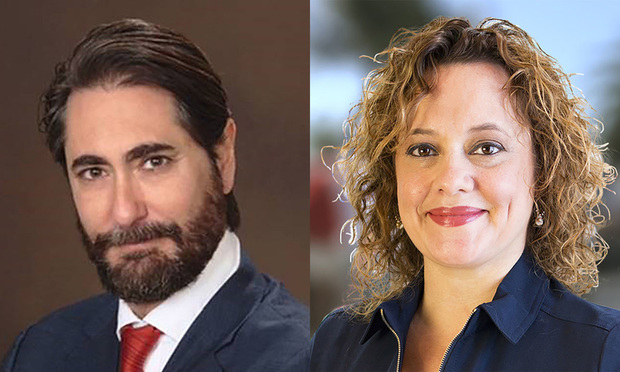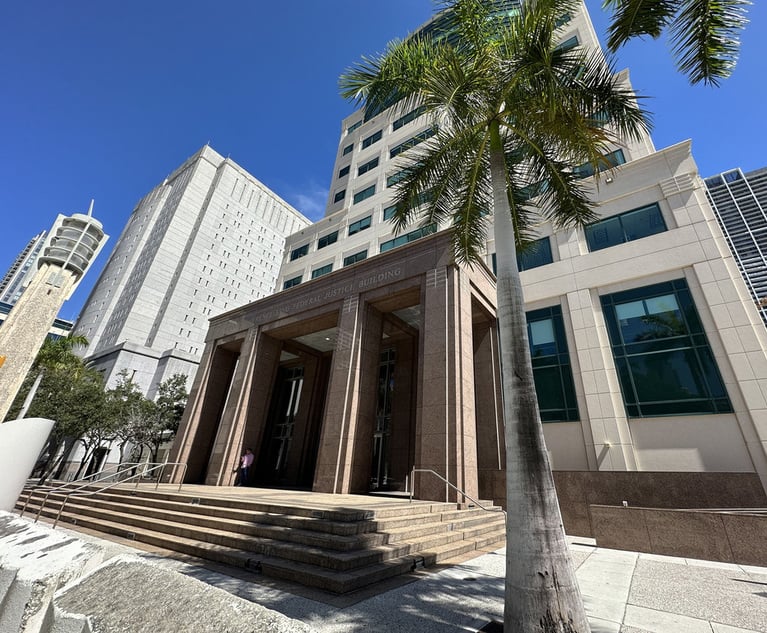Milena Abreu and Miguel 'Mike' Mirabal Face Off in Race for Miami-Dade County Judge
A traffic-hearing officer and international law attorney are running for Miami-Dade County Court judge, Group 43.
August 13, 2018 at 04:32 PM
7 minute read
 Miguel “Mike” Mirabal and Milena Abreu, running for Miami-Dade County Court Judge Group 43 in upcoming primary elections. Courtesy photos
Miguel “Mike” Mirabal and Milena Abreu, running for Miami-Dade County Court Judge Group 43 in upcoming primary elections. Courtesy photosThis is part of the Daily Business Review's coverage of the 2018 elections, featuring a series of Q&As with South Florida judicial candidates. This installment features attorney and traffic-hearing officer Milena Abreu and international law attorney Miguel “Mike” Mirabal, running for Miami-Dade County Court judge, Group 43.
Here's what they had to say about what qualifies them for the bench. Responses have been edited for style and content.
Milena Abreu
Abreu has been a licensed attorney for almost 20 years, handling death penalty cases for the Office of Criminal Conflict. For the past eight years, she has worked as a traffic hearing officer, presiding over thousands of civil traffic infractions, which she says has cemented her knowledge of civil, criminal and administrative procedure, and given her the ability to be an empathetic listener to all litigants.
Abreu is a member of several voluntary bar organizations including the Cuban-American Bar Association, Dade County Bar Association, the Florida Association for Women Lawyers and board member of the Florida Association of Criminal Defense Lawyers-Miami. She is former chair of two local ethics grievance committees. Abreu is also a “fiercely proud” mom, with hobbies including flamenco dance, motorcycling and scuba diving.
Abreu has also applied for a judicial appointment and is among candidates being interviewed by the Judicial Nominating Commission.
Why do you want to become a county court judge?
Abreu: “This is unfair!” “I know my rights!” “I'll see you in court!”
Although somewhat cliche, these declarations reflect the core American belief that the court system is the cornerstone of United States democracy. As a daughter of Cuban exiles who grew up learning about the grave effects a dictatorship has on a judiciary, these “cliches” hold a deep personal meaning for me. The judiciary, including the attorneys who litigate cases to the judges who decide them, carry the important responsibility of preserving freedom, equality and justice.
I have been privileged and honored to carry that responsibility both as a litigator and hearing officer, a responsibility I take seriously. The calling to serve as a county court judge is but an extension of that honorable responsibility.
What about your experience qualifies you for the position?
Abreu: I have litigated more than 100 jury trials to verdict and 100 bench trials to verdict. I am one of only a handful of attorneys certified to try death penalty cases, and I have served as a traffic hearing officer in the same court where I seek to be elected for the past eight years. Together those experiences have given me a firm basis in evidence, civil and criminal procedure, administrative rules of court and ethics to serve this calling.
What's your biggest achievement so far?
Abreu: Receiving the endorsements from such a diverse cross-section of organizations including the League of Prosecutors, Police Benevolent Association, SAVE-Dade, AFL-CIO, United Teachers of Dade, United Faculty of Miami-Dade College, The Community Newspapers, the Miami Herald, the State Fraternal Order of Police, Emgage and Local Firefighters 1403.
What would a successful term look like for you?
Abreu: A successful term as a judge for me would be to improve the access to the courts and the judicial system for everyone. Specifically, alleviating the number of court appearances for midnight police officers, attorneys and pro se litigants, reducing the trial audits and successfully resolving and closing cases.
What is the most important issue facing the Miami-Dade county courts at the moment?
Abreu: Access to the judicial system and large caseloads.
Miguel “Mike” Mirabal
Mirabal was born, raised and educated in Miami, and received his Juris Doctorate degree from Barry University School of Law. After graduating, he opened a practice and several businesses in Miami, and worked for Inter Juris, an international law firm based in Madrid, Spain, with offices in Venezuela, Honduras, Mexico and Panama. In Madrid, he obtained dual degrees in Spanish Law EU and an LLM in International Law. Mirabal returned to open Inter Juris' Miami headquarters.
In recent years Mirabal has acted as a court-appointed guardian ad-litem attorney, a pro bono attorney in family law, immigration, international sex trafficking, custody and domestic violence cases. Mirabal is the liaison and coordinator with Global Humanitarian and Protect, an international nonprofit organization set up to produce, feed and educate at-risk women and children, and simultaneously extradite and prosecute American pedophiles and child sex traffickers in Latin America.
Why do you want to become a county court judge?
Mirabal: For me the calling of being a judge is an ingrained vocation. It is the culmination of nine years of legal studies, 14 years of legal work, more than 35 years of community service and university-teaching experience. My vocation to the judiciary is more than a change in careers. It's a lifelong calling and passion. I truly believe that my education background, wide-ranging legal practice, and decades of community service and activism can be of great use to the residents of Miami-Dade County. I will bring needed diversity, extensive legal knowledge and broad-ranging legal experience to the bench.
What about your experience qualifies you for the position?
Mirabal: I have more than nine years of legal studies: US law degree, J.D., LLM in international law and international relations, and a five-year law degree from one of the largest universities in Europe, as I am licensed to practice law in both the United States and Europe. I also hold a master's degree in international business and have been a college professor in the subjects of Business Law I and II.
Almost 15 years as an attorney in a variety of legal disciplines, including corporate, small business, in-house counsel, civil, international law, domestic violence, business litigation, family law, employment discrimination and immigration law. I have litigated in almost every facet of county and circuit court, as well as in Europe and have worked extensively as a lawyer in Latin America. Also I have done many years of pro bono work in the areas of family law, LGBTQ issues and guardian ad litem. More than 35 years of community service and activism to many causes, nonprofits and charity organizations.
What's your biggest achievement so far?
Mirabal: Establishing my successful minority-run and -owned law firm and my mentoring program. I have been involved with several mentoring organizations to mentor mostly minority high school, college and young law students. Also due to my diverse multi-jurisdictional background, I can help local or international clients easily navigate through the US, European or Latin American legal systems with ease. I have crossed this expertise over into helping my pro-bono and guardian ad litem clients.
What would a successful term look like for you?
Mirabal: One where I ccould help as many people as possible while administering justice fairly, equitably, but with professionalism and compassion.
What is the most important issue facing the Miami-Dade county courts at the moment?
Mirabal: Several factors, one of which is lack of diversity on the bench and lack of diversity/inclusion training. Another factor is clogged court dockets, which slows down the administration of justice, and erodes the community's faith in the courts. The third serious issue is the school-to-prison debacle and the tendency to put juvenile offenders directly into the adult criminal court system.
This content has been archived. It is available through our partners, LexisNexis® and Bloomberg Law.
To view this content, please continue to their sites.
Not a Lexis Subscriber?
Subscribe Now
Not a Bloomberg Law Subscriber?
Subscribe Now
NOT FOR REPRINT
© 2025 ALM Global, LLC, All Rights Reserved. Request academic re-use from www.copyright.com. All other uses, submit a request to [email protected]. For more information visit Asset & Logo Licensing.
You Might Like
View All
What Will Happen to the Nominees in Florida's Southern and Middle Districts?
3 minute read


Big Law Lawyers Fan Out for Election Day Volunteering in Call Centers and Litigation
7 minute readTrending Stories
- 1Supreme Court Takes Up Challenge to ACA Task Force
- 2'Tragedy of Unspeakable Proportions:' Could Edison, DWP, Face Lawsuits Over LA Wildfires?
- 3Meta Pulls Plug on DEI Programs
- 4On the Move and After Hours: Meyner and Landis; Cooper Levenson; Ogletree Deakins; Saiber
- 5State Budget Proposal Includes More Money for Courts—for Now
Who Got The Work
Michael G. Bongiorno, Andrew Scott Dulberg and Elizabeth E. Driscoll from Wilmer Cutler Pickering Hale and Dorr have stepped in to represent Symbotic Inc., an A.I.-enabled technology platform that focuses on increasing supply chain efficiency, and other defendants in a pending shareholder derivative lawsuit. The case, filed Oct. 2 in Massachusetts District Court by the Brown Law Firm on behalf of Stephen Austen, accuses certain officers and directors of misleading investors in regard to Symbotic's potential for margin growth by failing to disclose that the company was not equipped to timely deploy its systems or manage expenses through project delays. The case, assigned to U.S. District Judge Nathaniel M. Gorton, is 1:24-cv-12522, Austen v. Cohen et al.
Who Got The Work
Edmund Polubinski and Marie Killmond of Davis Polk & Wardwell have entered appearances for data platform software development company MongoDB and other defendants in a pending shareholder derivative lawsuit. The action, filed Oct. 7 in New York Southern District Court by the Brown Law Firm, accuses the company's directors and/or officers of falsely expressing confidence in the company’s restructuring of its sales incentive plan and downplaying the severity of decreases in its upfront commitments. The case is 1:24-cv-07594, Roy v. Ittycheria et al.
Who Got The Work
Amy O. Bruchs and Kurt F. Ellison of Michael Best & Friedrich have entered appearances for Epic Systems Corp. in a pending employment discrimination lawsuit. The suit was filed Sept. 7 in Wisconsin Western District Court by Levine Eisberner LLC and Siri & Glimstad on behalf of a project manager who claims that he was wrongfully terminated after applying for a religious exemption to the defendant's COVID-19 vaccine mandate. The case, assigned to U.S. Magistrate Judge Anita Marie Boor, is 3:24-cv-00630, Secker, Nathan v. Epic Systems Corporation.
Who Got The Work
David X. Sullivan, Thomas J. Finn and Gregory A. Hall from McCarter & English have entered appearances for Sunrun Installation Services in a pending civil rights lawsuit. The complaint was filed Sept. 4 in Connecticut District Court by attorney Robert M. Berke on behalf of former employee George Edward Steins, who was arrested and charged with employing an unregistered home improvement salesperson. The complaint alleges that had Sunrun informed the Connecticut Department of Consumer Protection that the plaintiff's employment had ended in 2017 and that he no longer held Sunrun's home improvement contractor license, he would not have been hit with charges, which were dismissed in May 2024. The case, assigned to U.S. District Judge Jeffrey A. Meyer, is 3:24-cv-01423, Steins v. Sunrun, Inc. et al.
Who Got The Work
Greenberg Traurig shareholder Joshua L. Raskin has entered an appearance for boohoo.com UK Ltd. in a pending patent infringement lawsuit. The suit, filed Sept. 3 in Texas Eastern District Court by Rozier Hardt McDonough on behalf of Alto Dynamics, asserts five patents related to an online shopping platform. The case, assigned to U.S. District Judge Rodney Gilstrap, is 2:24-cv-00719, Alto Dynamics, LLC v. boohoo.com UK Limited.
Featured Firms
Law Offices of Gary Martin Hays & Associates, P.C.
(470) 294-1674
Law Offices of Mark E. Salomone
(857) 444-6468
Smith & Hassler
(713) 739-1250






